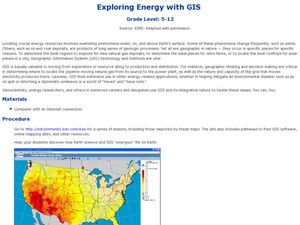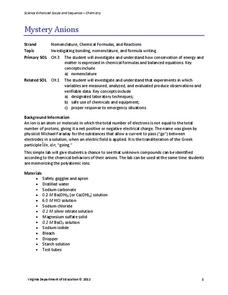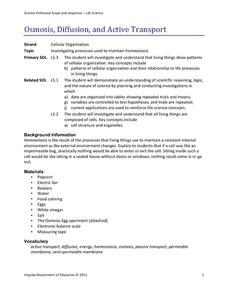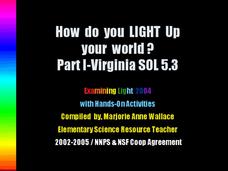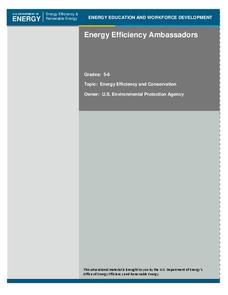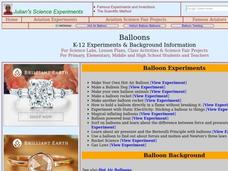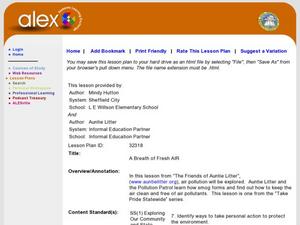Curated OER
Batteries
In this battery activity, students answer 14 questions about primary cell batteries, secondary cell batteries, and how batteries are charged. They calculate the rates of discharge for given batteries.
Alabama Learning Exchange
Light Reflection and Absorption
Students discover what types of objects reflect and absorb light. In this science inquiry activity, students use flashlights to determine whether different objects absorb or reflect light.
Curated OER
Exploring Energy with GIS
Students examine GIS technology as it is used to locate energy sources. In this GIS lesson, student access an assigned website to locate a series of lessons using the GIS software. They use the maps that are located on the primary lesson...
Curated OER
Plate, punch card, and instructions for Herman Hollerith's Electric Sorting and Tabulating Machine
Pupils read an article and participate in a class discussion. In this technology and engineering lesson students conduct an online search for images and terms.
Curated OER
The Science of Color and Light
Students listen to a story about colors and then conduct various experiments to determine how people see colors, identify which colors stand out best from a distance, show the results of mixed colored lighting and explain the phenomenon...
Curated OER
Transformers
Young scholars examine how a transformer works and its practical applications. In this electricity instructional activity students complete several experiments using transformers and generators.
Curated OER
Open and Closed Circuits
Students distinguish between open and closed circuits. In this open and closed circuits lesson plan, students use their bodies as electric conductors and understand how electricity is a form of energy.
Virginia Department of Education
Mystery Anions
Lost an electron? You should keep an ion them. Young chemists learn qualitative analysis in the second lesson of an 11-part chemistry series. After observing reactions of simple salts, the teacher provides pupils with unknown...
Virginia Department of Education
Acids and Bases
What did one titration say to the other titration? We should meet at the end point! Young chemists perform four experiments: dilute solution, neutralization, titration, and figuring pH/pOH.
Curated OER
Energy Concepts - Lesson Plan
Learners state the different forms of energy; and observe the effects of energy changing from one form to another (other forms) in electrical appliances.
Virginia Department of Education
Osmosis, Diffusion, and Active Transport
No, it really is okay to play with your food! Emerging scientists manipulate popcorn, eggs, and other household objects as they demonstrate multiple cellular processes. The activity, capable of modifications, is designed to reflect...
Virginia Department of Education
Chemical Bonds
How are chemical bonds similar and how are they different? Provide your young chemists with the resources to more thoroughly understand the concepts of ionic and covalent bonds. Pupils research these topics, diagram examples of each...
Virginia Department of Education
Predicting Products and Writing Equations
A chemistry lesson presents 14 chemical reactions for scholars to observe, write the equation, and balance the equations. Additionally, it provides ways to extend the activity as it relates to catalysts.
Curated OER
Arc Flash and Arc Blast
In this arc flash and arc blast worksheet, students answer ten questions about the conditions that lead to arc flashes and arc blasts. They describe each and explain how to protect from these occurrences.
Curated OER
How Do You Light Up Your World?
A fabulous presentation on light is here for you. In it, learners view slides which cover many important concepts of light. They understand exactly what light is, what the main sources of light are, what opaque, transparent, and...
Curated OER
How Do You Light Up Your World?
A tremendous presentation on the properties of light. Young scientists are treated to slides which share a lot of fascinating information about light. This impressive PowerPoint is filled with great photos, graphics, and discussion...
Mascil Project
Design and Build Your Own Vacuum Cleaner, Hair Dryer or Toy Car
No vacuum cleaner? No problem, just build your own. Scholars apply knowledge of currents to build a model of either a vacuum clear, a hair dryer, or a toy car. While the class completes the activity, instructors consider gender...
BBC
Ourselves
Young biologists identify parts of the body, sort humans from other animals, and list the difference they see. Learners are split up into groups of three, and each group must find pictures in magazines of humans and other animals. They...
Curated OER
Energy Efficiency Ambassadors
Pupils consider how to cut their energy use. For this physical science lesson, students investigate the connections between energy use and climate changes. Pupils compute the actual electrical energy consumption of 2 bulbs and consider...
Curated OER
Balloons
Students explore the different types of balloons. In this materials lesson students can complete several experiments including building their own hot air balloons, making balloon animals and experimenting with static...
Alabama Learning Exchange
Magnet Mania
Students explain how magnets can be used to make some things move without being touched. They explore that electricity in circuits can produce light, heat, sound, and magnetic effects. They create an electronic poster about magnet with...
Curated OER
A Breath of Fresh Air
Students explore the primary function of the respiratory system in multiple activities. In this respiratory system lesson, students build a model of the respiratory system to investigate how the lungs work.
Curated OER
Edible Coal Mining
Learners explore the concept of bituminous coal and the role it plays within our world. In this economic and earth science lesson, learners discover and model the extraction methods with hands-on activities. Learners also...
National Energy Education Development Project
Exploring Nuclear Energy
Every 18–24 months, nuclear power plants shut down to remove their used uranium fuel, a radioactive waste. Show learners how energy is made and used around the world and then focus on the United States' usage. Viewers then specifically...




